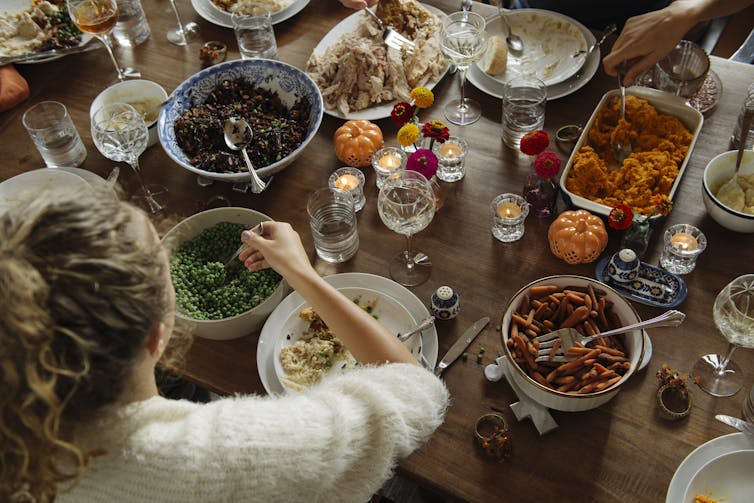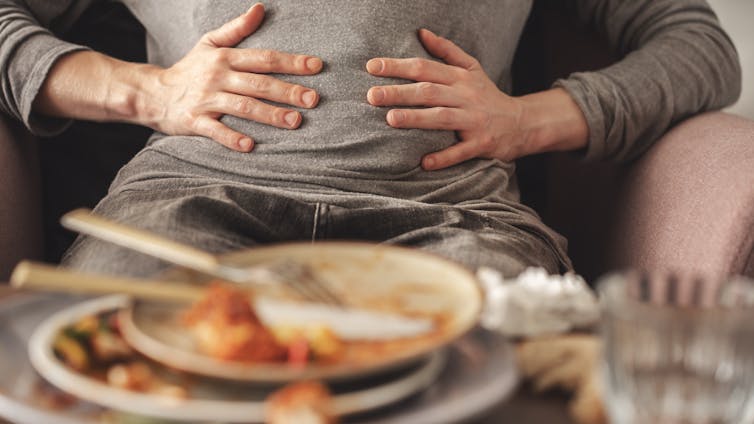Don’t stress out about overeating during the holidays – a dietitian explains how a day of indulgence won’t harm your overall health
- Written by Bryn Beeder, Visiting Instructor in Kinesiology, Nutrition, and Health, Miami University
For many, holidays are synonymous with quality time and long-standing traditions. Typically laden with delicious foods, it’s not uncommon to eat more during the holidays than you usually would.
You likely know that feeling of being too stuffed – the point when you’re pleasantly satisfied one moment and uncomfortably full the next. On top of that physical discomfort can come extra helpings of guilt for eating more than you wanted or expected.
The physical and psychological pressure of holiday meals can be challenging. As a registered dietitian, I want to assure you that your body knows what to do with that extra food and drink, and that your overall health and well-being are defined by much more than a few days of indulgence. In fact, the experience of eating and sharing food may play a valuable role in creating lasting, positive memories of the holiday season.
Still, if you’ve ever wondered what’s happening inside your body after a big meal, you’re not alone. Understanding a bit about how digestion works can make the post-meal feelings a little less mysterious and a lot less stressful.
Slowing down digestion
Food is made up of three main macronutrients: carbohydrates, proteins and fats. Your gastrointestinal tract uses both mechanical and chemical processes to break down these nutrients into their simplest form so they can be absorbed and used for energy, repair and carrying out biological functions.
 It’s common to eat more than you usually would during a holiday gathering.The Good Brigade/DigitalVision via Getty Images
It’s common to eat more than you usually would during a holiday gathering.The Good Brigade/DigitalVision via Getty ImagesWhen you eat a large holiday meal, you will likely consume more of all the macronutrients than you usually would, in a shorter period of time. The larger quantity of food will require a bit more time to digest, meaning it will move more slowly along your GI tract.
Protein and fats also naturally take longer to break down. While more carbohydrate-rich foods, such as a granola bar or a glass of orange juice, give you a quick burst of energy, adding more protein- and fat-rich foods, such as eggs or chicken, to your meal provides energy that lasts longer.
In this case, the slower digestive process can actually be beneficial for steady energy and appetite control.
Physical discomfort
Rest assured, your digestive system will carry on no matter how big the meal. Rather, the question is how long digestion will take and whether that may cause some temporary discomfort along the way.
When you eat, your stomach stretches to accommodate the food you consumed. As the stomach works to pass food contents into the small intestine, there is an increased chance of heartburn – a backflow of acidic stomach contents that can cause a burning sensation in your chest or sour taste in your mouth. Extra food can also lead to stomach pain, nausea, gas and bloating, as well as a general sluggish feeling.
 Digesting a large meal can be uncomfortable.seb_ra/iStock via Getty Images Plus
Digesting a large meal can be uncomfortable.seb_ra/iStock via Getty Images PlusEven before the first bite, your body begins preparing for digestion. The first sight and smell of food increases your body’s production of saliva and stomach acid in anticipation of the work ahead.
When the workload is greater than usual, your body temporarily expends more energy to fuel the digestive process, both in breaking down macronutrients and in absorbing that fuel for use later. As a result, it is typical to feel more tired after a large meal.
To reduce the physical discomfort of digestion, try staying upright after a meal. While lying down may be tempting, it can increase stomach pain and the risk of heartburn. Give your body time and let gravity work in your favor by staying upright for at least two to three hours after eating. A 10- to 15-minute walk can also be beneficial to the digestive process, increasing stomach contractions and overall blood flow to the GI tract. This can in turn move food out of the stomach and into the small intestine more efficiently.
Moving past food guilt
One day of indulgence alone will not cause permanent weight gain or lasting changes to your physical health. But repeated patterns of food guilt can, over time, lead to an unhealthy relationship to food.
Beyond digestion, the way you think and talk about food can be just as important as how you feel after eating. Food does not have moral value, and yet it is easy to become caught in the habit of labeling foods as “good” or “bad.” This mindset often shows up during the holidays. Think about how often you hear yourself or others say, “I was good all morning so I can eat more tonight” or “I’m going to be bad and have the pie, too.” How you speak about food directly shapes how you feel about eating it and about yourself.
 Food nourishes your body and your relationships.Catherine Falls Commercial/Moment via Getty Images
Food nourishes your body and your relationships.Catherine Falls Commercial/Moment via Getty ImagesFood can also bring positive emotions and good memories. When your body recognizes a strong emotion tied to a food smell, the emotional center of your brain – the amygdala – alerts the part of your brain that forms and stores long-term memories, your hippocampus. This explains why the smell of grandma’s pie can transport you to a vivid memory.
This holiday season, focus less on the calorie count and more on the company, the laughter, and the scents and flavors that make your traditions special. Eat the foods that bring you comfort and connection; you’re nourishing more than just your body.
Bryn Beeder does not work for, consult, own shares in or receive funding from any company or organization that would benefit from this article, and has disclosed no relevant affiliations beyond their academic appointment.
Authors: Bryn Beeder, Visiting Instructor in Kinesiology, Nutrition, and Health, Miami University

